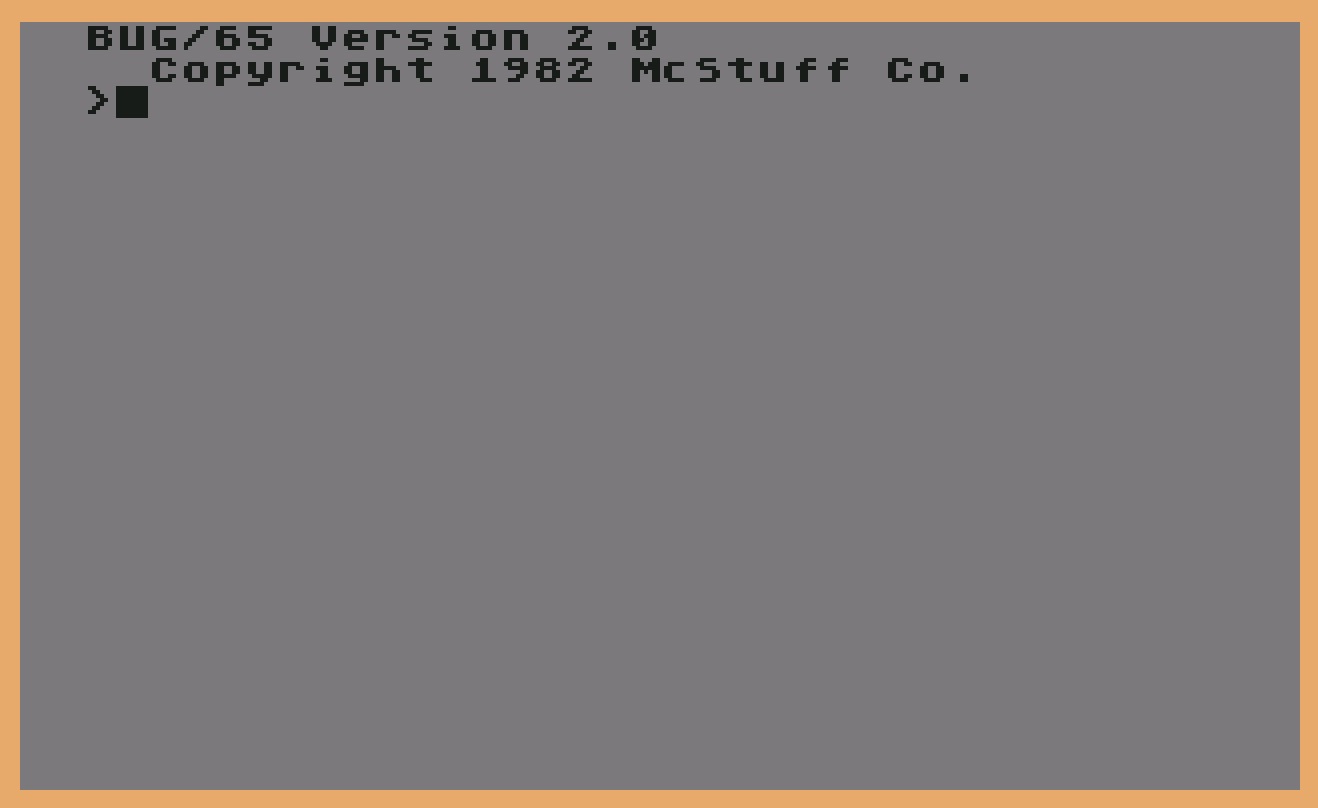Bug/65 Version 2.0 (C) 1982 McStuff Co. and Optimized Systems Software, Inc.#
Powerful Debugger for Atari 8 Bit#
Image:#
 |
ATR-Image:#
- MAC-65 2.00 and 4.20 with Bug-65 2.0 and DOS XL 2.30.atr
 ; all versions, normal and relocatable, further with append program, see below
; all versions, normal and relocatable, further with append program, see below
Manuals:#
- BUG-65 Manual 1.pdf
 ; size: 102 KB
; size: 102 KB
- BUG-65 Manual 2.pdf
 ; size: 283 KB
; size: 283 KB
- BUG-65 Manual 3.pdf
 ; size: 213 KB
; size: 213 KB
- BUG-65 Manual 4.pdf
 ; size: 233 KB
; size: 233 KB
- BUG-65 Manual 5.pdf
 ; size: 987 KB
; size: 987 KB
BUG/65 APPEND PROGRAM ON MAC/65#
BUGV4FIX.COM ; We are still searching for that file, it seems to be lost. Any help, any hint in that case is very much appreciated. :-)#
At the end of the Bug/65 manual we can read:
1. Copy the files BUG65.COM and BUGV4FIX.COM to a version 4 disk using the COPY24 command (see the DOSXL manual for details on this command).
2. At the version 4 "D1:" prompt, type the command: BUGV4FIX (RETURN).
3. The file BUG65.COM on that disk is now compatible with version 4 of DOSXL.
WARNING: Do NOT perform the BUGV4FIX command on your version 2 master disk!
Creating a non-relocatable version#
In order to allow itself to be relocated virtually anywhere in memory, BUG/65 as shipped includes a relocation bit map and relocation program. In addition, relocatable BUG/65 always loads in at locations $9800 through $BC00. If these addresses are "poison" to you (e.g., if you want to use BUG/65 with a cartridge plugged in), you may wish to produce a non-relocatable version designed to run within an address range you pick. If so, USING A 48K SYSTEM, simply specify the loadpoint, as shown in the preceding section (e.g., via BUG65 7000) and allow BUG/65 to load and relocate. Then exit to OS/A+ (via Quit) and use OS/A+ intrinsic command SAVE to save a non-relocatable version. The address range to be SAVEd may be calculated as follows:
SAVE filename.com loadpoint+$200 loadpoint+$2000
Thus, if you had specified "BUG65 7000", you could save the non-relocatable version via
SAVE BUG7000.COM 7200 9000
thus also giving it a name which will later remind you where it will load at. To execute this non-relocatable version, simply type in its name (BUG7000 in the example shown).
Summary of major features of BUG/65#
• A full set of debugging commands - change memory, display memory, goto user program with break points, etc.• Binary file read and write, including appended write
• A disassembler
• An instant assembler providing labelling capability
• Expanded command addressing capability: hex or decimal addresses, + and - operators supported, relocated addresses supported
• Read or write disk sector(s)
• Multiple commands permitted in a command line. Command lines can be repeated with a single keystroke or repeated forever with the special slash operator.
• Support for relocatable assemblers - the base of a module can be specified and then used to reference addresses in that module
• BUG/65 commands can be executed from a command file, and there is a command to create command files
• Hex to decimal and decimal to hex conversions provided
• Memory protection of BUG/65's code and data. BUG/65 won't allow you to use a BUG/65 command that will destroy any part of BUG/65 itself. For example, you can't use the Fill command to overwrite BUG/65's code.
• Page zero sharing. BUG/65 shares page zero with a user program by keeping two copies of the shared page zero locations - one for the user and one for BUG/65 itself.
